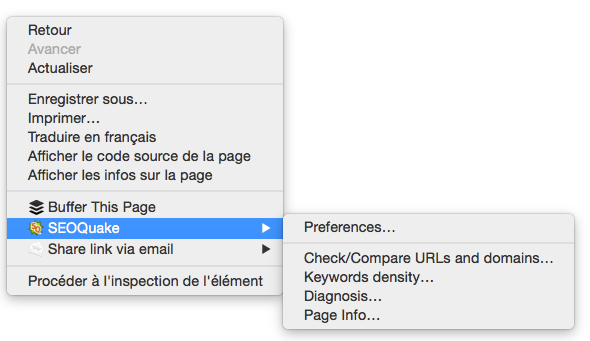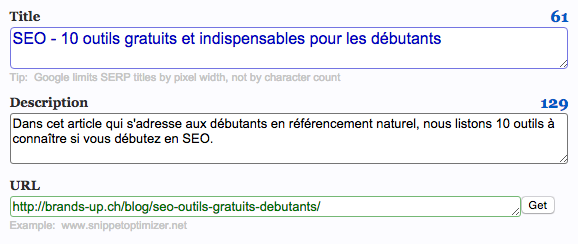The acronym SEO is a little scary, There, we’ve said it.
Referencing? Natural? Optimisation? Google Analytics? Performance? It’s true that, when listening to certain professionals in this field, it’s easy to be put off by the seeming complexity of the subject. But you’re not the sort of person to be discouraged, are you?
Because everyone has to start somewhere, we’ve put together a list of essential tools and extensions to help you get to know this domain.
So, here are 10 tools and extensions, classified by theme, which should be helpful if you’re just starting out.
(If you’re after a more in-depth article about SEO techniques, this article is unfortunately not aimed at you.)
Audience analysis
If you want to get an idea of what sort of health your site is in, it’s vital that you link your site to Google Analytics and Google Search Console. These two tools will also allow you to measure the effectiveness of any changes you make to your site as a result.
- 1. Google Analytics
This is the audience analysis tool that Google offers. It allows you to see lots of figures relating to your site’s activity: number of visits, unique visitors, time spent per page, traffic from search engines… It’s a must-have.
Google Analytics
- 2. Google Search Console (formerly Google Webmaster Tools)
This is another audience analysis tool, and enables you to check whether your site is well-indexed, to identify errors on your pages (404 pages, duplicate tags…), to see which keywords are generating traffic to your website, etc.
So, how is this different to Google Analytics? Well, Analytics collects data when users visit your site, while Google Search Console shows you the state of your website as Google sees it, whether you have visitors or not.
Google Search Console
Performance & Audit
Whether your site has been going for 5 years, 1 year or 2 weeks, it’s always a good idea to test its performance in order to draw up a health report for your pages, the speed of your site, etc. Here are a few practical tools which will give you some interesting figures:
- 3. Google Pagespeed Insights
This online tool from Google allows you to analyse the content of your website (or webpage) in order to improve its speed. The tool will give you a ‘score’, as well as some recommendations for the desktop and mobile versions of your site.
Pagespeed Insights
- 4. Pingdom Tools
We believe it’s wise to carry out tests using several different tools so you can compare the data. So, here’s another tool which will test the loading speed of your website (and pages):
Pingdom Tools
- 5. ntegrity (MAC) – Xenu (PC)
If you want to list and identify the errors that your site may contain, Integrity (for Mac) and Xenu (for PC) are very effective. They notably enable you to:
- Make a local copy of all the URLs on your site to get a general view of the indexed pages
- Identify the pages on your site which contain errors (404 errors for example) so you can set up the necessary redirections
These free tools are very easy to use and will give you a good overall view of the pages on your site.
Free download:
Keywords search
You probably already know that the keywords chosen for your site will play a big role in determining your positioning (amongst other factors) on search engines.
In order to get an idea about keywords in relation to your activity, competition for certain terms, and to obtain suggestions for keywords, you can use these two online tools:
- 6. AdWords’ keyword planner
This tool from Google (again) allows you to evaluate the relevance of keywords and find new keyword ideas.
Keyword Planner
- 7. Ubersuggest
This is a very powerful complementary tool which allows you to get suggestions from one or several keywords.
Ubersuggest
- 8. Google Trends
Yes, another tool from Google (!) which is very useful if you want to compare trends between certain keywords, in the country of your choice.
Google Trends
On-page optimisation
- 9. SEO Quake Toolbar for Chrome
If you want to know what can be improved on a particular page on your site, we recommend that you use the extension SEO Quake for Google Chrome. With just a right-click on the page you wish to investigate, you can:
- Measure the keyword density of your page
- Carry out a diagnostic of your page (relevance of URL, title, description, H1, H2, H3 tags, image ALT attributes)
- Obtain information about your page (number of incoming/outbound links)

- 10.Snippet Optimizer
In order to get a concrete idea of how a blog article, webpage or section on your site that you’re about to publish or modify will appear on a search engine, you can carry out a simulation using the online tool Snippet Optimizer.
Here’s an example with this very article.
We enter the title, description and URL in the appropriate fields.

This is what our article will look like once it has been indexed:

This tool is interesting because it enables you to know how many characters can be entered before the title or description are cut off.
---
Of course, this isn’t an exhaustive list – it’s just a list that we think will be useful to help get you started. In a future article, we’ll discuss the essential paying SEO tools.
In the meantime, good luck getting started!
[BONUS] : 5 blogs to follow
As a bonus, here are 5 blogs you really should follow if you want to learn more about SEO:
---

